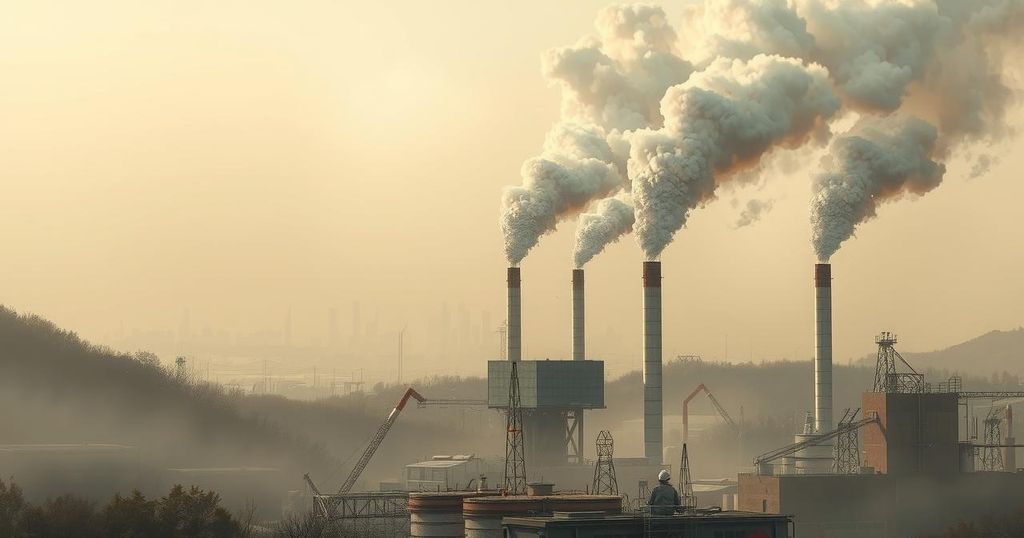Ghana, Nigeria, Chad, Rwanda Among Most Polluted Countries: 2024 Air Quality Report
The 2024 World Air Quality Report reveals that Ghana, Nigeria, Chad, and Rwanda rank among the most polluted countries worldwide, with Chad having the highest PM2.5 concentration. The report indicates a significant health crisis due to air pollution, which is responsible for thousands of premature deaths each year in Ghana. Recommendations for urgent government action to improve air quality are imperative to address this growing problem.
The 2024 World Air Quality Report has identified Ghana, Nigeria, Chad, and Rwanda as some of the most polluted countries globally, indicating a severe air quality crisis that poses risks to millions. Chad ranked first, with a PM2.5 concentration of 91.8 µg/m³, nearly 18 times the World Health Organization (WHO) guideline. Nigeria, Rwanda, and Ghana followed with PM2.5 levels of 40.1, 40.8, and 35.8 µg/m³, respectively.
PM2.5 particles are perilous pollutants that penetrate the lungs and bloodstream, causing grave respiratory and cardiovascular issues. They are significantly smaller than dust particles and human hair, rendering them almost invisible but highly toxic. Research from the University of Chicago suggests that air pollution reduces life expectancy by approximately 2.7 years in heavily polluted regions. In Ghana, an estimated 28,000 people are believed to die prematurely each year due to air pollution, a death toll emphasizing the urgent need for action.
Air quality in Ghana exceeded WHO’s recommended limit by seven times, with the capital, Accra, being ranked as the 16th most polluted city globally, recording 36.3 µg/m³. Notably, Kumasi has emerged as Ghana’s most polluted city, reaching a PM2.5 level of 39.5 µg/m³. Ghana’s position has deteriorated sharply, moving from 27th in 2022 to 14th in 2024.
Across Africa, environmental monitoring remains insufficient, with only 24 of 54 countries providing air quality data. The report highlights that five of the top ten polluted countries globally are in Africa. Moreover, a significant percentage of African cities report PM2.5 levels substantially above WHO guidelines, further showcasing the continental pollution crisis.
Ghana’s air pollution has transformed into a pressing public health emergency, equating to one death every 19 minutes due to toxic air exposure. If trends continue, approximately 2,333 individuals could die monthly. The escalating PM2.5 levels and the consequent health risks emphasize the necessity for urgent intervention.
Global air quality remains disparate, as only 17% of cities worldwide meet the WHO air pollution guideline. Conversely, some countries have successfully maintained cleaner air; for instance, Nieuwoudtville in South Africa is the only African city meeting WHO standards in 2024.
The worsening of air quality in Africa is attributed to rapid urbanization, population growth, unregulated emissions, and waste burning. Notably, non-governmental organizations are now responsible for a majority of air quality data collection, highlighting a significant gap in government-led initiatives.
As air quality deteriorates, there is mounting pressure on Ghana’s government to tighten environmental regulations. Recommendations include stricter vehicle emissions regulations, increased investment in renewable energy, more air quality monitoring stations, and an end to unregulated burning practices. With Ghana now ranked among the world’s top 15 polluted countries, immediate action is imperative to mitigate this growing crisis.
The 2024 World Air Quality Report underscores a critical air pollution crisis impacting Ghana and several other African nations. The alarming PM2.5 levels highlight the urgent need for comprehensive strategies to address this public health emergency. Without decisive measures, millions will continue to face detrimental health consequences from worsening air quality. The call for stronger environmental policies and increased monitoring is crucial to safeguard public health and the environment in these regions.
Original Source: www.myjoyonline.com




Post Comment